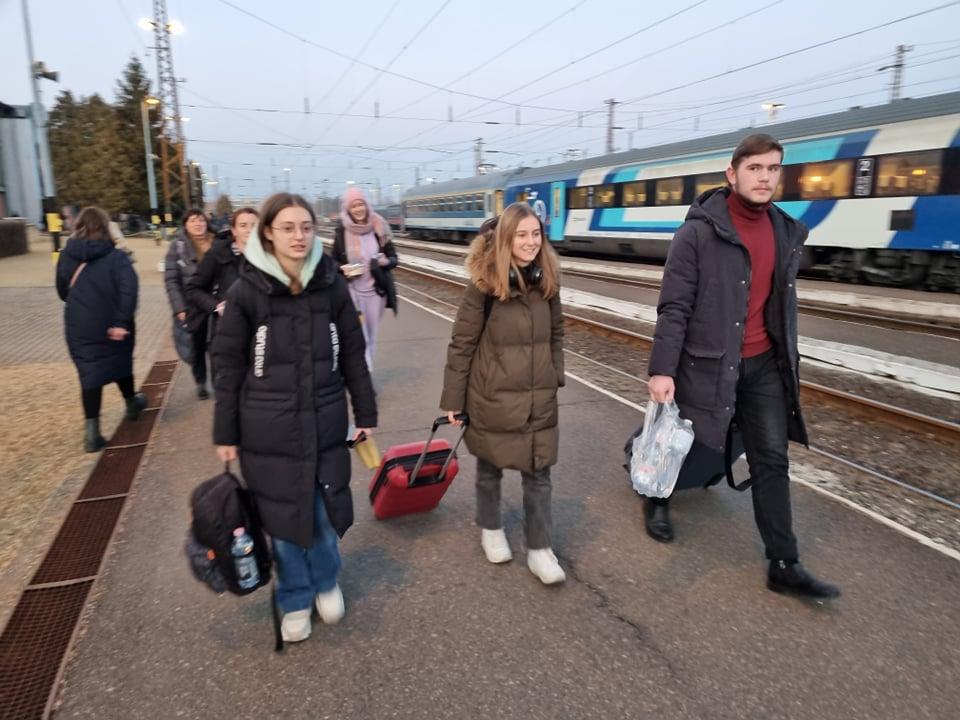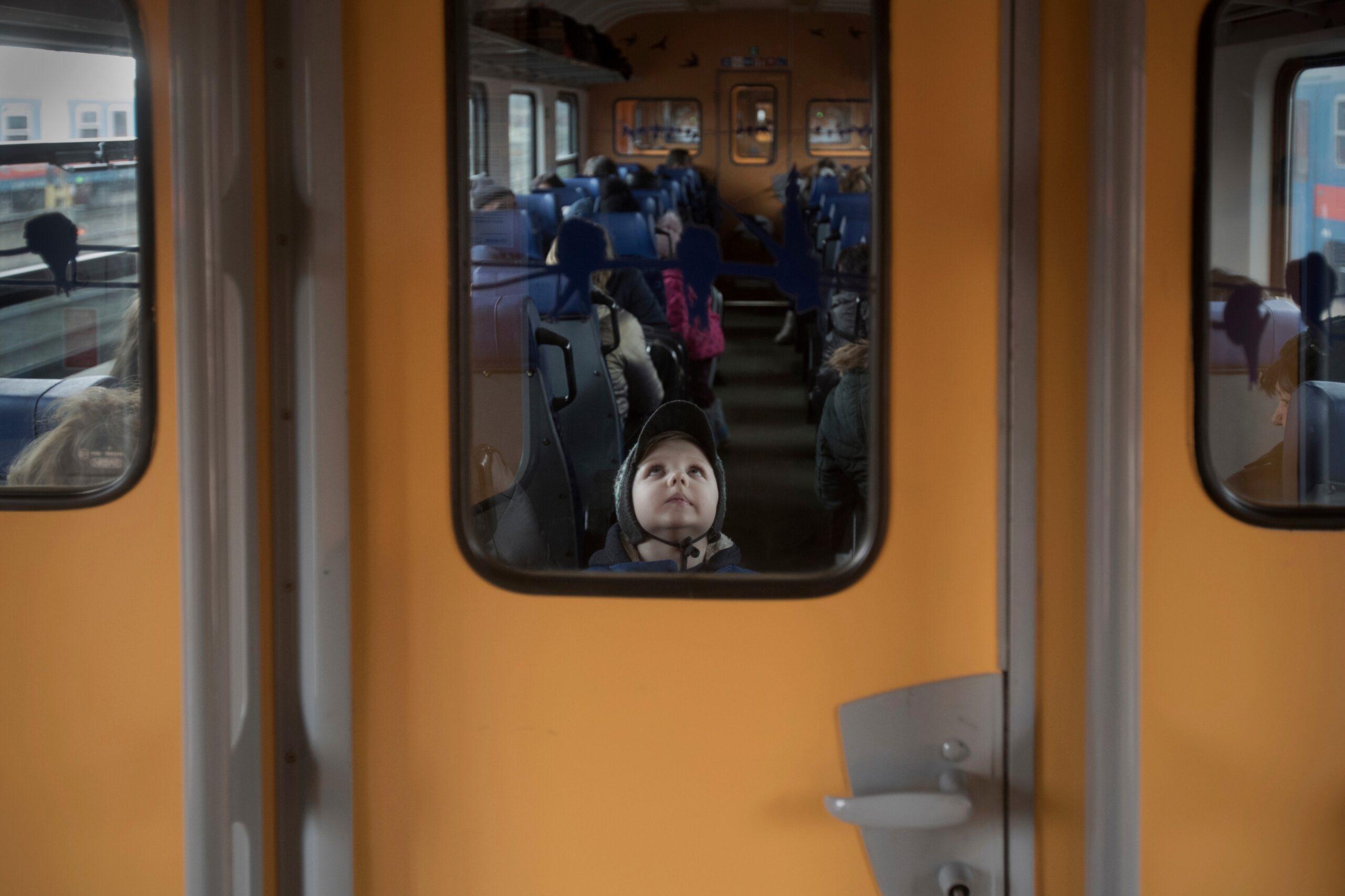Orchestrating an escape from war-torn Ukraine
With the aid of fellow Slovenian musicians, the Ukrainian Youth Symphony Orchestra managed to flee the advancing Russian forces which have invaded swathes of their homeland. Despite their gratitude at being rescued, they miss their families and yearn to return to Ukraine.

“The last time I played my violin was on the eve of the war. When the bombs began to fall, I left it alone because I was afraid we might miss the warning sirens because of the music. Since then, I never once took the violin out of my travelling bag,” Myroslava Bundziak, a 20-year-old violinist from Kyiv, told me at the Zahony railway station on the Hungary-Ukraine border.
After fleeing the Ukrainian capital, Myroslava's next few days were long and infinitely arduous. Amid the frightening press of refugees thronging on the trains and railway stations, she held fast to her violin, the core of her identity. All the while, she made sure to keep close to her group of 62 young musicians, all members of the Ukrainian Youth Symphony Orchestra. Their evacuation was both initiated and carried out by the Slovenian Youth Orchestra.
A logistical nightmare
“I was so very afraid. To be honest, I froze for a bit – I didn't know what to do. I couldn't believe how many of us were fleeing our homes. Only a day before the war started, I went to school and then to practice. We were planning concerts and even a day trip or two. Everything was normal,” Myroslava said. She shivered in the fierce cold which gnawed at the very bone marrow no matter how many layers of clothing one put on.
Her voice was quiet and remarkably collected. “I'm glad I'm safe. They told me that in Ljubljana, where we're headed, I will be able to continue practising my instrument. But my thoughts remain in Ukraine, with my family and my friends. This is so very hard for me. I am grateful for all the help. But all I can really think of is: when can I go home?”
Waiting for the last of her companions to join her on the next stage of their flight, Myroslava held up a piece of paper saying ‘Ukrainian Youth Symphonic Orchestra'. Amid the frenzied chaos governing the railway station, this was her way of helping locate those peers who were especially hard to bring into the fold.

On Sunday, three trains had come in from the small town of Chop, on the Ukrainian side of the border. Each of the trains was carrying some 700 Ukrainian refugees. Among them were a number of evacuated young musicians, aged seven to 20. The Hungarian police singled out some of them for special processing, on account of their incomplete documentation. Myroslava was now trying to make sure no one would get left behind.
The Ukrainian trains kept arriving in Hungary with a delay of at least a few hours. At the Zahony station, the refugees then had to wait up to two hours for registration. Most of them were exhausted, all of them were freezing, and some looked shell-shocked. The logistics of gathering up all the young musicians, travelling by various trains from various directions, were something of a nightmare.
The process of keeping the group together was proving hard to control. Since the rescue mission was quite literally launched overnight, virtually every aspect of it demanded improvisation. Some of the young musicians were accompanied by their parents and/or siblings. Their contingent, now slowly gathering at the Zahony station, had reached the border from across their homeland. They had come from Odessa, Kharkov, Kherson, Kyiv, Zhytomyr, Lviv, and several other Ukrainian cities now indelibly etched onto our collective consciousness – and for all the wrong reasons. As is usually the case, these God-forsaken parts are still unable to shake off the curse of being at the forefront of history.
A birthday tale
“We're now feeling a little bit better. But only a little. Our men are still there. Many of them are already on the battlefield. My fear is that very soon all of them will have to fight. Oh, this is bad, this is so very bad,” said Yulia Sherbinska, a 40-year-old refugee from Herson. I got talking to her at a parking lot near the railway station, where a pair of buses were about to set off on the long drive from Hungary to Slovenia.
After two weeks of siege, practically all of Herson was taken over by Russian troops. Along with her husband and 12-year-old violinist daughter Maria, Yulia left her home on the first day of war. It took the family three days to reach Lviv, where relatives were able to put them up for a few days.
Yulia's husband and Maria's father decided to remain in Lviv and join the resistance against the Russian invasion. Last Friday, Yulia got word of the opportunity to depart for Slovenia. She didn't have to ponder long: “I can only hope my daughter and I can return home soon. And that my husband will survive. Everything else doesn't seem all that important right now.”
I also interviewed Olga Mikolyuk, also from Kyiv, right before she boarded the bus. “My daughter, a violinist and pianist, celebrated her birthday on the third day of war,” the visibly drained woman recalled. “We're from Irpinj, a town on the outskirts of Kyiv bombed by Russians. They were mostly targeting the airfield. Since the bombs were already falling, my daughter had to blow out her candles in the hallway of our tenement building, with three walls to protect her.”
Before disappearing into the bus, Olga spared a few more words conveying her utter shock. She found herself still unable to quite believe her homeland was now consumed by war. “Well, today we're already here,” she shared with something between a smile and a wince. “But my husband had to stay in Kyiv. I am so shocked and confused. What I really can't get my head around is the fact that we were attacked by Russia, where we have so many relatives and friends.”
No school trip
Later that night, the pair of buses finally revved up their engines. Their well-heated interiors helped some of the evacuated girls to fall asleep for the first time in days. Their previously frozen cheeks were quick to acquire a warm rosy glow. The group's heavy, trauma-induced silence began to fill up with chatter and even occasional laughter. For a moment, the atmosphere took on the cozsness of a typical school trip.
But only for a moment.
As already stated, the project of helping young Ukrainian musicians escape had been initiated by the Slovenian youth orchestra, spearheaded by its founder and artistic director Živa Ploj Peršuh. “As soon as I realised war had broken out in Ukraine, I felt we needed to do something to help,” she recalled mere moments after the second bus safely reached Ljubljana. “It was on Thursday evening when we decided to focus on getting the Ukrainian Youth Symphonic Orchestra out.”
As we conversed, the passengers from the first bus were already being moved into two of the Slovenian capital's youth hostels. Živa Ploj Peršuh went on to assure me that everyone involved in the evacuation project was geared up for the possibility of a lengthy stay of their Ukrainian guests: “The aim is to start involving them as fully as possible in the Slovenian society, affording them as normal a life as possible … Which of course also means extending every possible opportunity to keep pursuing their love of music.”



